by Sonam Srivastava, Siddharth Singh Bhaisora
Published On Oct. 12, 2023
In our highly connected world, wars fought across countries in different parts of the world will always have an impact on us, be it in India or anywhere else. And historically, this has also affected stock markets negatively due to economic instability, trade disruption, societal impact and the uncertainty that comes with wars. And they are difficult for everyone directly and indirectly involved. There will be loss of life on all sides of a war. Often time has complexities of religion, social causes, long standing issues that are extremely difficult to comprehend and many other challenges. It is a topic that we cannot shy away from, but the human losses, geopolitical & societal nuances, and the vast complexity of untangling wars are best left to experts. But as investors we should try to understand what these wars mean for us as an individual, for our economy and even our country.
In this article we will look across wars fought over time and how they have impacted stock markets, in India and across developed economies. We will not be able to deep dive into the economic impact of wars, especially on countries involved, in this article - that will be a topic for another day. But through this article we hope to understand how we as investors can chart a path when conflicts and wars break out unpredictably.
Wars are unpredictable and so is the impact on stock markets.
When World War I broke out in 1914, the S&P 500 index fell 18% in just 3 months.
For World War II, which also led to a similar impact, the S&P 500 index fell by 30% in the first year.
The Gulf War in 1990 was no exception, the S&P 500 index fell 15% during a 6 month period.
The 1990 Iraq invasion of Kuwait saw immediate global stock market declines. 3 days post-invasion, Dow Jones Index slumped over 6%.
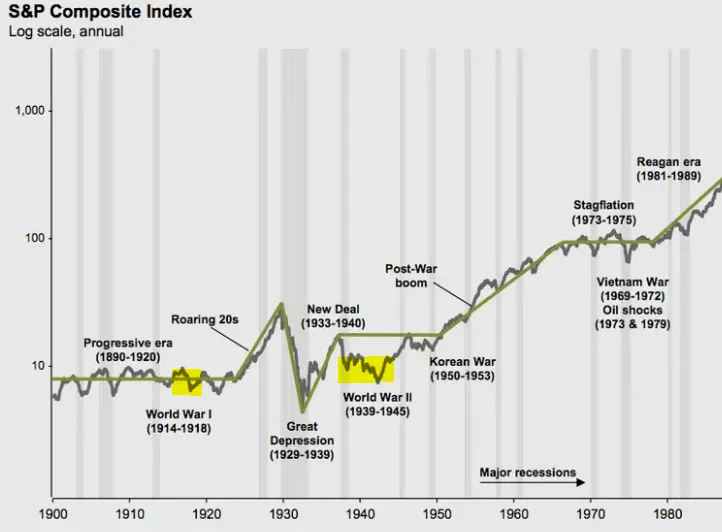
However, downward trends aren’t always the case, here are some examples that show how unpredictable the impact of wars can be on stock markets.
Korean War, which unfolded between 1950 and 1953, witnessed the Dow surging by an annualized 16%
First four weeks of Operation Desert Storm saw Dow Jones index increase by 17%
When the 2003 Iraq War started, the European stock market responded positively.
The precarious Cuban Missile Crisis of 1962, where nuclear conflict loomed ominously for 13 days, the Dow only slid by a minimal 1.2%, recuperating with over a 10% gain for the rest of that year.
Here’s the annual S&P 500 returns during periods of war over time. It ranges from 6.25% to 19.28% 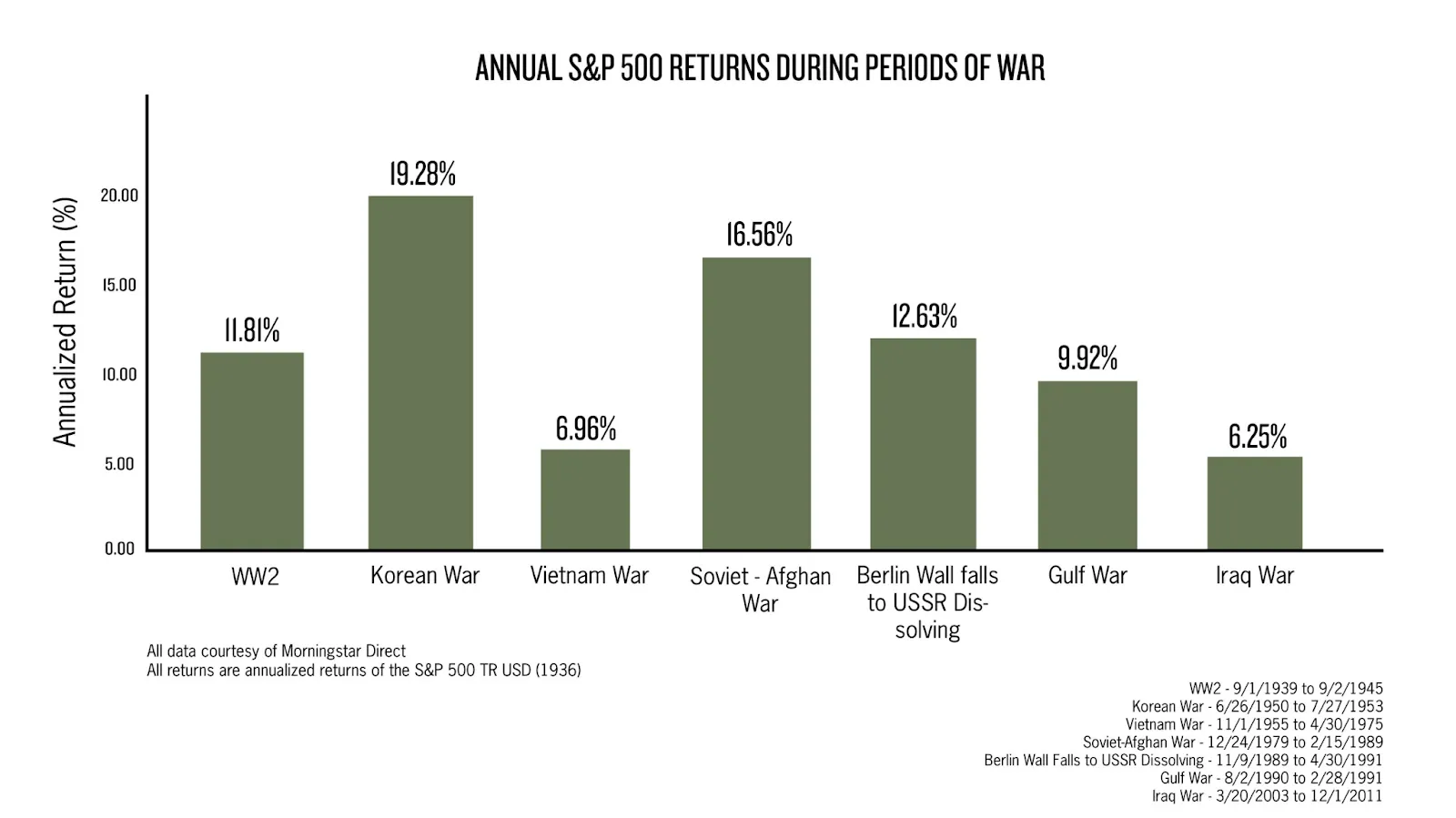
These instances showcase diversity in financial reactions and inherent challenges of predicting market responses to war and conflict. The precise nature of the relationship between geopolitical crises and market dynamics isn’t as straightforward as one might presume. Often, rules of thumb and apparent logic yield to surprising outcomes, suggesting that perhaps market movements are influenced by a confluence of factors that go beyond the immediate crisis. And while our immediate market responses to wars tend to be negative, the extent of impact varies considerably. Let’s try to make sense of this unpredictability and see what factors could influence stock markets during a war.
But not all wars have such sharp reactions to a war, such as the Vietnam and Korean wars had marginal impact on global markets relative to World War II. There are a lot of factors that can affect how stock markets react when news of a war is announced and during the war as well.
Disparate conflicts exert divergent influences on the stock market. When the conflict is limited to a specific region, such as the Vietnam war or the Korean war, the impact was contained to those economies and had some impact on their trading partners. The nature of the conflict in terms of resources, trade channels etc. that are impacted are critical to understand and evaluate to truly understand the scope of a war on the economy and the stock markets.
Prevailing economic conditions prior to a war in the affected country can also impact market resilience. A weaker economy prior to a war means that it will take much longer for the economy and the stock market to recover. Similarly a stronger economy will result in a faster recovery. For instance if we look at World War I, Great Depression & World War II we can see fast recovery of the US economy following each of these events.
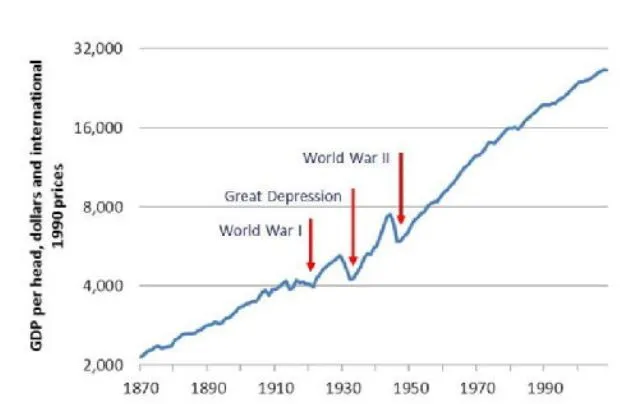
The US economy had recovered strongly post the Great Depression, and before World War II it was performing well with GDP growth rates at 10%+ for many years. As World War II started, there was a sharp impact of the war on the US economy, but it recovered quickly once the war ended.
Strong government expenditure, specifically on defense, infrastructure, utilities etc. can help boost the economy and sometimes offset some of the broader negative impacts on the market. Higher spending from governments is a predictor of lower stock volatility in total for the market and especially for military goods products. As we can see during World War II, US government spending increased and stock volatility remained low. And such effects aren’t limited just to US markets, but can be seen across global equity markets.
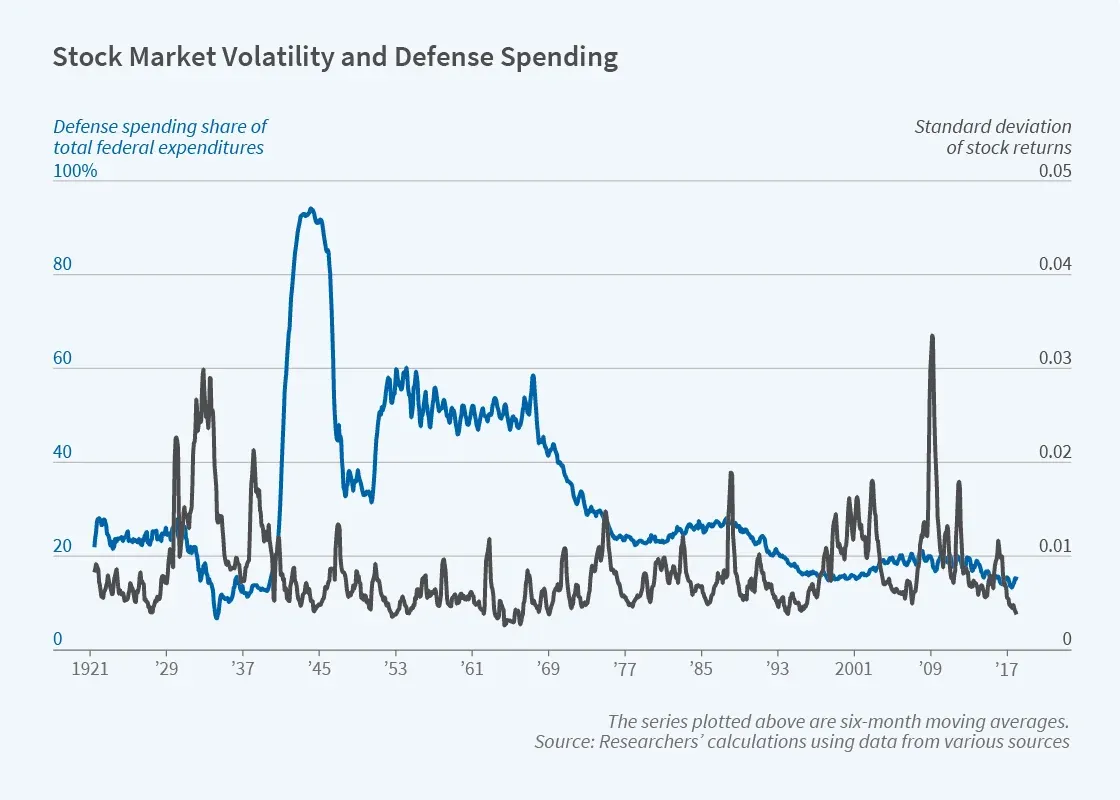
Relationships between wars or geopolitical conflicts and stock market outcomes isn’t simple, clear or inevitable. Wars will always negatively impact stock markets, especially those that are directly impacted by the war. And while we have historically seen markets recover on a long enough horizon, the real question is what are the lasting effects of wars on stock markets?
Before World War I, the gold standard was followed to fix exchange rates between countries. Western economies had financially integrated. However when World War I started exchanges shut down by August 1 1914.
NYSE stopped the exchange and all its operations for 4 months and witnessed severe volatility upon reopening. Dow Jones traded at 60% of January 1913 levels. Despite this instability, American stocks rallied, with a more than twofold increase by November 1916 as seen in the graph below. From 1914 to 1918, the overall increase amounted to 43%, or an annualized return of approximately 8.7%.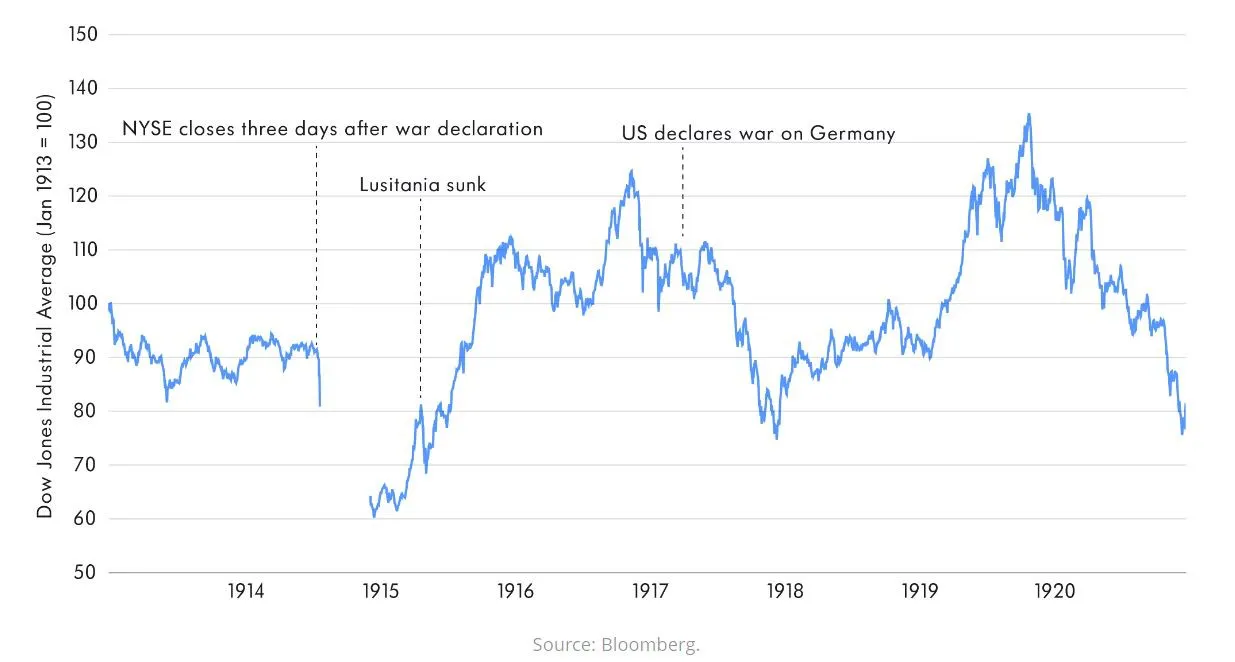
Some exchanges like the Berlin Stock exchange didn’t open till 1917. And other exchanges like those in Paris & London opened a few months later but had heavy restrictions on the prices that shares could be sold at.
European Nations directly involved in the War: Nations such as Great Britain, France, and Germany predominantly saw a negative impact on their stock markets during World War I. They faced economic challenges with war-time inflation at all time highs and the need to prioritize war bonds over equity markets to fund the war. Countries that won the war saw a boost in their stock markets, while countries that lost did poorly in their stock markets. As we can see in the graph below, nations on both sides of the war took a few years to recover with strong recovery for winning nations and stock markets reached their peak in 1929.
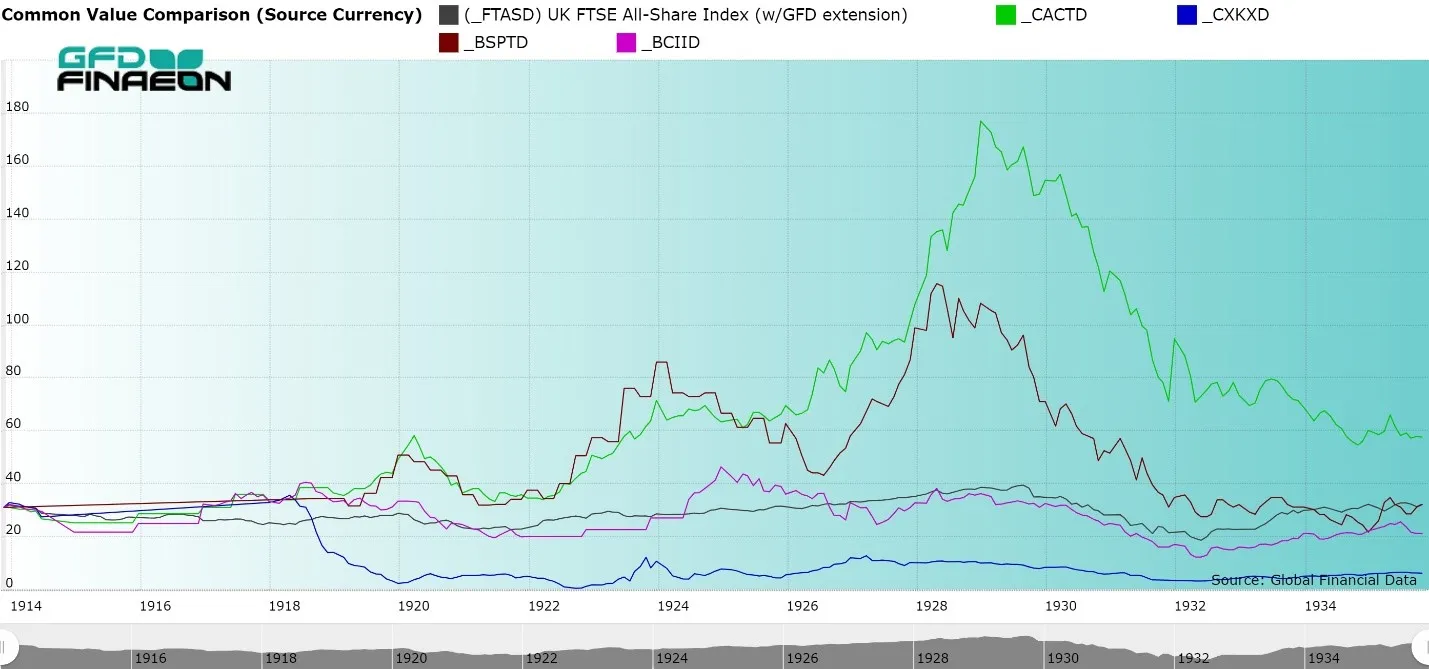
Neutral European Nations: In stark contrast, neutral entities such as Spain and the Netherlands initially witnessed strong positive trends in their stock markets during the war. However, their economies were highly dependent on free trade which fell post World War I and they saw their stock markets trend downwards. There was an improvement with some increase till 1929, however when 1929 great depression happened in the US, these markets fell further. 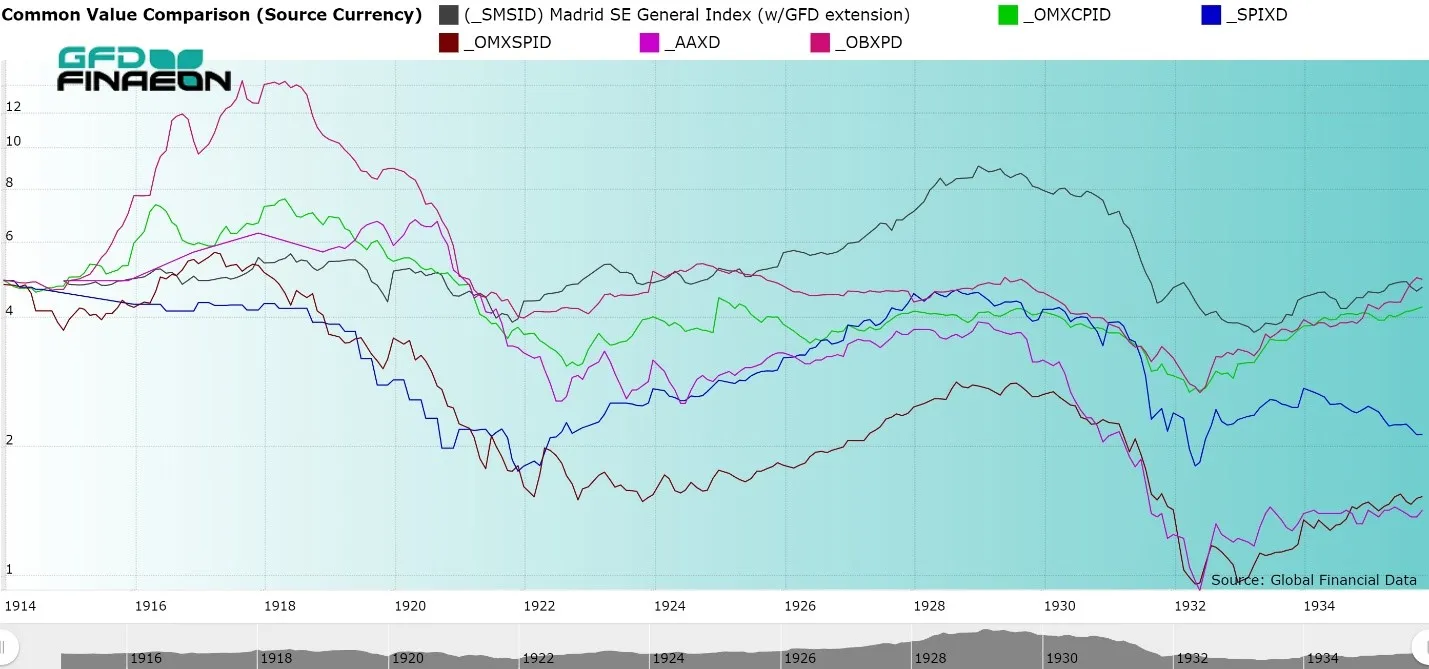
Non-European Nations: United States and Canada, buoyed perhaps by their ability to export goods to Europe during and after World War I, saw strong growth in the stock markets both through and after the war. This continued at least until the 1929 peak when Great Depression hit.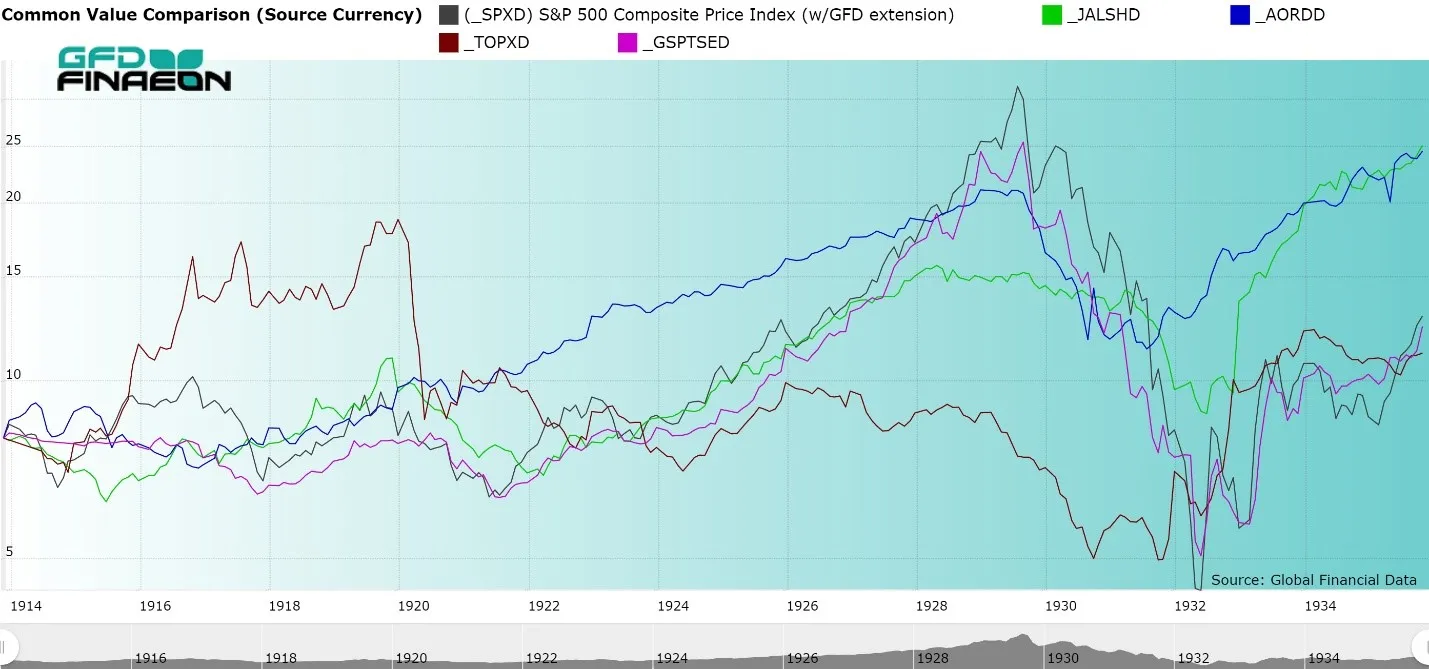
Interestingly, this helps us understand how the impact of a war on a nation’s economy and stock market varies depending on the role the participant played in the war.
Onset of World War II in 1939, marked by Hitler's invasion of Poland, surprisingly propelled the Dow upwards by almost 10% on the following market day, September 5.
Significant wartime events, such as the attack on Pearl Harbor in December 1941 and D-Day in June 1944, saw the market respond with unexpected resilience and even growth.
Between 1939 and 1945, the Dow increased by 50% or annualized gains exceeding 7%.
As fears of a war between India and Pakistan broke out in 1999, Nifty50 fell by around 13%
Nifty50 rallied when the Kargil War started, increasing by as much as 41% during the period. And it continued the rally after the war had ended.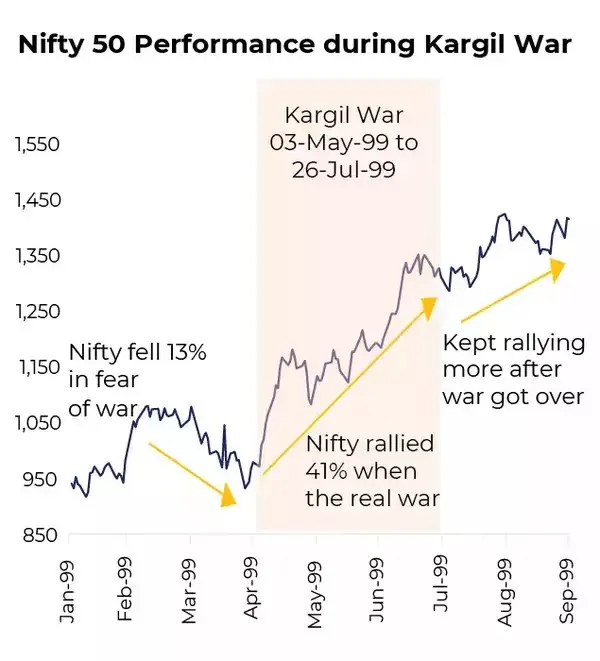
Indian markets anticipated the war and had corrected even before it had started. Conflict-induced volatility had precipitated market rallies and the volatility in the market during the Kargil War continues before (as part of anticipating it) and during the war. As the conflict approaches its end, the markets tend to bake that in and the momentum continues.
Terrorist attack on Sept. 11, 2001 resulted in stocks falling sharply across the board on all US stock exchanges with many falling by 15% in less than 2 weeks
During the time US economy was already in a recession and the dot-com bubble had bursted both of which also negatively impacted the market.
However, stock markets had recovered in a few months and gained all of the stock market losses that occurred during 9-11.
Leading up to the US Iraq War in 2003, stock markets were highly volatile. Stocks rose 2.3% on the day of invasion.
Dow Jones Industrial Average fell by over 2,000 points during the initial few weeks.
But it recovered and rallied in 2003 gaining 30% compared to its March 2003 lows. 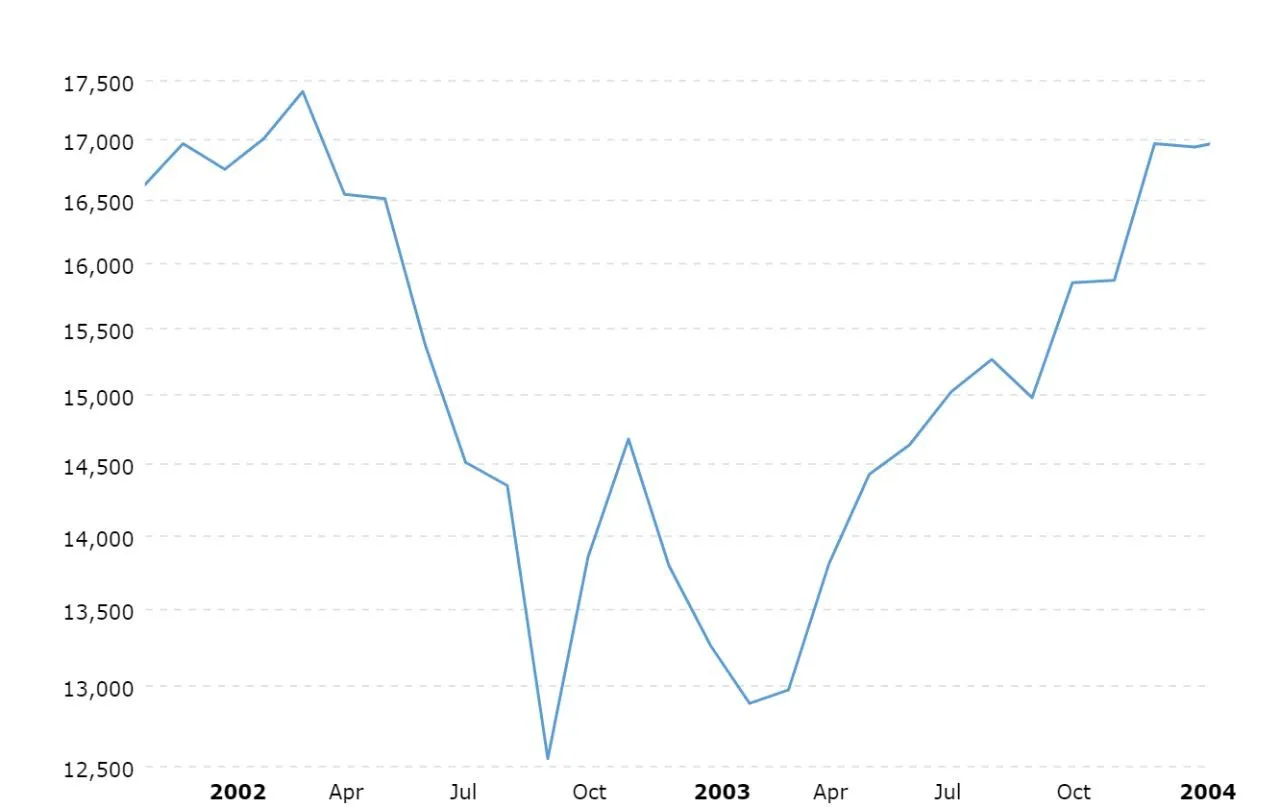
Recent invasion of Ukraine by Russia destabilized global markets, stocks fell across indices globally. S&P 500 index fell by 7%.
However, subsequent events, including intensified economic sanctions on Russia, pandemic recovery for economies globally etc influenced markets significantly. And stock markets rebounded within a month and exceeded pre-invasion levels.
From a strictly economic viewpoint, the war didn’t hold as much weight in market movements as other ongoing global events.
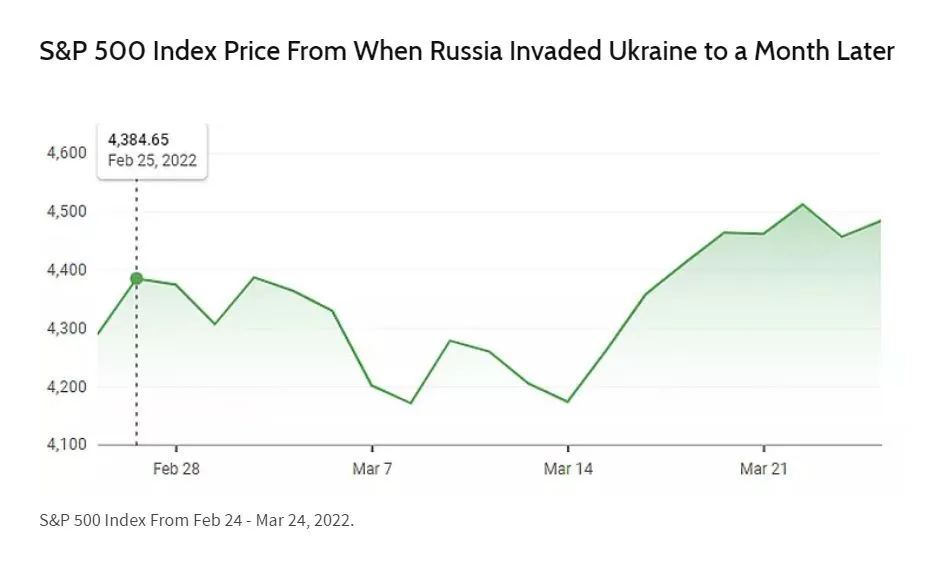
Well we have looked at quite a few wars and conflicts to understand what happens with stock markets across different geographies. There is a trend that we can identify even where wars are unpredictable, especially when there isn’t a build up like we have seen with the recent Israel-Gaza, US 9/11, Russia- Ukraine crisis, there is still nonetheless a few puzzling factors at play.
The term "war puzzle" was coined by researchers at the Swiss Finance Institute in 2015 who found an intriguing pattern when analysing U.S. military conflicts post-World War II. It showed a dichotomy in stock behaviour contingent on the predictability of the conflict. They identified that in scenarios where a war's onset was anticipated, an uptick in the likelihood of war correspondingly depressed stock prices, while the actual commencement of war saw them rally. We saw this phenomenon in the Kargil war example above. Conversely, in instances where war was unforeseen and unpredictable, the conflict saw a decline in stock prices.
There is another contradictory effect of wars and conflicts on stock market behaviour that defies conventional intuition. Mark Armbruster, President of Armbruster Capital Management, investigated stock market volatility from 1926 till July 2013.
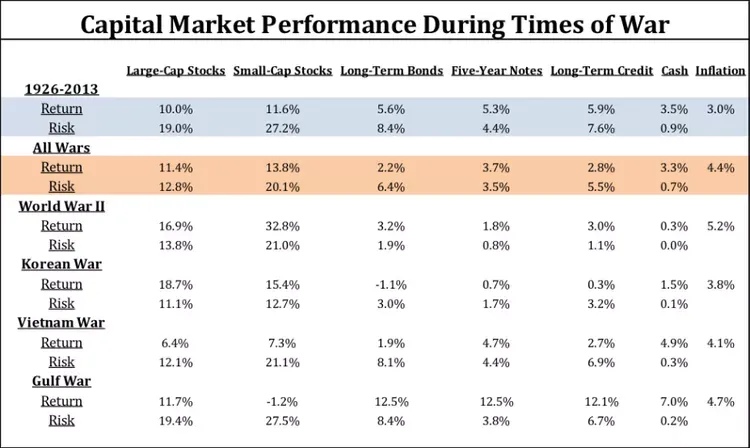
He found that stock market volatility was predominantly lower during periods of conflict, excluding the Gulf War, where it resonated with historical averages. One would expect geopolitical uncertainty to seep into the stock market, but that wasn’t the case.
On a long enough horizon stock markets seem to bounce back during and after times of geopolitical conflicts and crises. This is especially true for developed economies and emerging economies. Here is an analysis of S&P 500 conducted by researchers, the one day change in the stock market, the total drawdown, the time it takes for stock markets to bottom out and the number of days for it to recover.
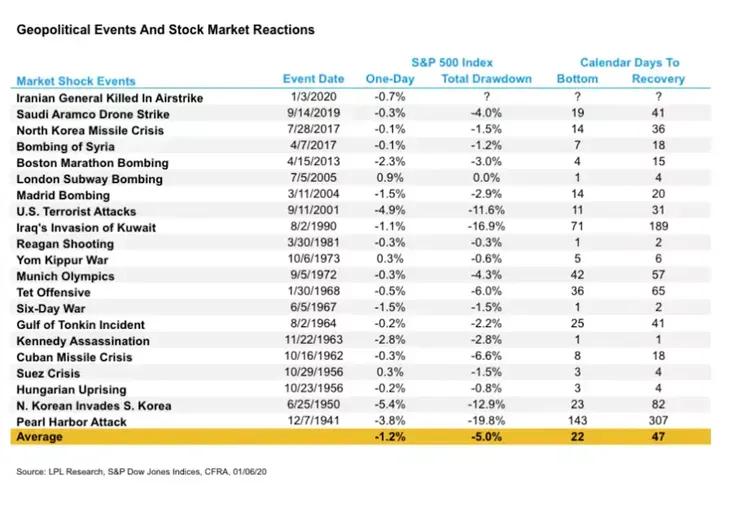
But the impact on other nations that are directly or indirectly a part of the conflict such as Iraq, Iran, North Korea etc. is something that needs more research and analysis.
Oil Prices: Middle East is a significant contributor to global oil supplies - contributing around 1/3rd to global oil supplies. Note, neither Israel or Gaza actually produce oil. But any instability in this region is enough to result in speculative price hikes due to potential supply disruptions - with early trade on Monday showing nearly 5% increase in oil prices. Historically, Middle Eastern crises have often led to spikes in oil prices, affecting global inflation rates and trade balances.
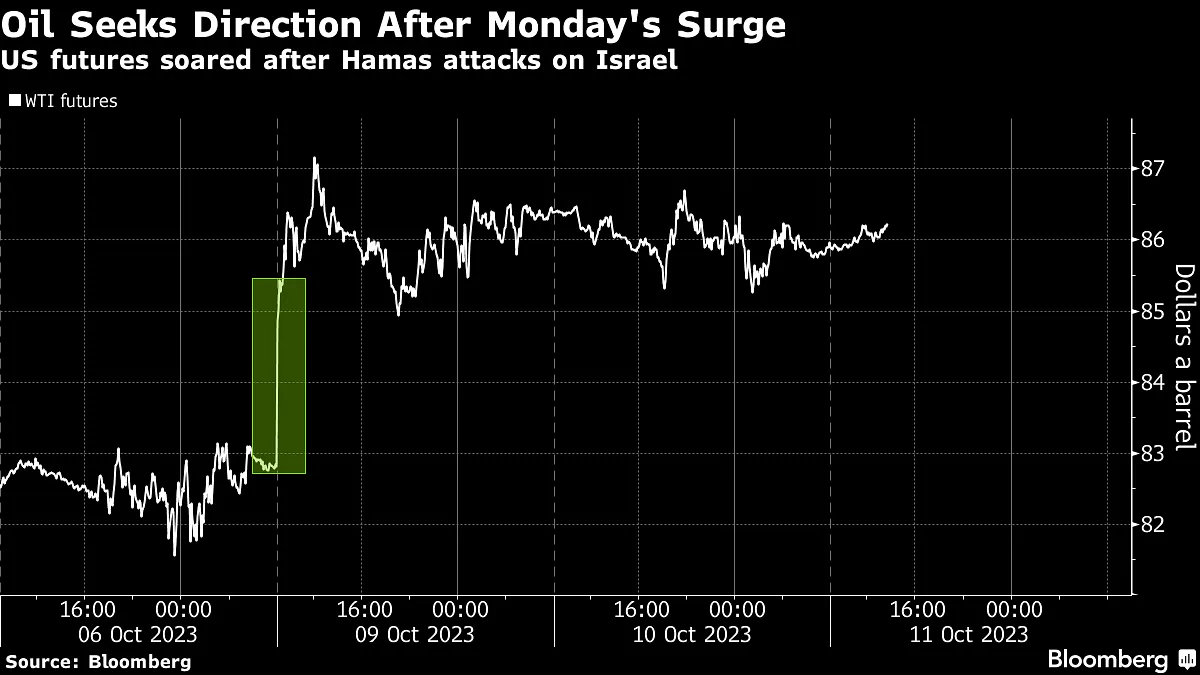
Safe-Haven Assets: During geopolitical tensions, investors tend to flock to "safe-haven" assets like gold, the Japanese yen, and U.S. Treasury bonds. The recent rise in gold prices post the Israel-Gaza tensions is consistent with historical trends observed during past Middle Eastern conflicts.
Equity Markets: Stock markets, especially in countries with close ties to the warring nations or those heavily dependent on oil imports, can experience volatility. For instance, the Indian stock market showed resilience post the recent tensions, but specific sectors with exposure to the Middle East faced pressure. The volatility index was hovering around 10%.
he impact of Israel war on Indian stock market can be significant, as geopolitical tensions often lead to increased market volatility. Investors closely monitor the effect of Israel war on Indian stock market, as it can influence global oil prices, foreign investments, and overall market sentiment. Historical data shows that such conflicts can trigger short-term sell-offs, but the long-term impact of Israel war on Indian stock market depends on the duration and severity of the conflict. Understanding the effect of Israel war on Indian stock market helps investors make informed decisions and adjust their portfolios to mitigate potential risks.
During the Second Intifada, a Palestinian uprising against Israel, global markets experienced volatility due to the uncertainty in the Middle East. The Indian stock market, still in its nascent stage of opening up to foreign institutional investors (FIIs), saw reduced inflows. The IT sector, which had started establishing connections with Israeli tech firms, faced potential disruptions.
When Israel and Hezbollah in Lebanon clashed in 2006, oil prices globally surged due to fears of a broader Middle Eastern conflict. India, heavily reliant on oil imports, saw its stock market react negatively to the rising oil prices. Companies in the aviation and logistics sectors, in particular, faced challenges due to the increased operational costs.
During this conflict, the global economy was already grappling with the financial crisis. The added geopolitical tension from the Israel-Gaza war further dampened the spirits of FIIs. The Indian market, already under pressure from the global financial meltdown, saw increased volatility, particularly in sectors like energy and IT.
In November 2012, another Israel-Gaza conflict erupted. While the direct impact on the Indian market was minimal, the rising oil prices due to Middle Eastern tensions did affect sectors like aviation, logistics, and manufacturing. The IT sector, with growing ties in Israel, monitored the situation closely for potential business disruptions.
During the 50-day war in 2014, the Indian market showed resilience overall. However, sectors with direct exposure to the Middle East, especially aviation (due to oil prices) and IT (due to business operations), showed some volatility. The pharma sector, with growing ties to Israel, also kept a close watch on the developments.
Oil Prices: The Middle East accounts for nearly a third of global oil supply. The conflict has led to a surge in crude oil prices, with Brent crude and US West Texas Intermediate crude witnessing significant hikes. If the conflict spreads to other oil-producing nations in the region, especially Iran, the global economy could face severe repercussions.
Inflation: Rising crude oil prices can lead to high inflation globally. Major economies like the US, India, and China, which are significant oil importers, could experience high imported inflation if oil prices remain elevated. This can affect production costs across industries and increase energy costs for businesses and households.
Interest Rates: Central banks might struggle to control inflation, leading to prolonged elevated interest rates. This could hamper global economic growth.
Exports: India's exports to Israel, primarily petroleum products, account for 1.8% of India's total merchandise exports. If the conflict escalates, it could create supply-side problems.
Imports: India imports machinery, pearls, diamonds, and other precious and semi-precious stones from Israel. Any disruption could affect these imports.
Currency Impact: The conflict could lead to rupee depreciation, necessitating action from the Reserve Bank of India (RBI).
Equity Markets: The conflict has made investors wary, leading to a shift towards safe-haven assets. Equity markets globally have been affected, with US stock futures and Asian markets trading lower.
Safe-Haven Assets: Gold prices have risen, with both spot gold and US gold futures witnessing hikes. The dollar and Japanese yen also edged higher.
Indian Stock Market: While the of Israel War Effect on Indian Share Market might not be significant, the situation needs close monitoring, especially if other actors like Iran get involved. The Nifty 50's performance will be crucial to watch.
Geopolitical Concerns: If Iran enters the war, then oil prices will rise further as it holds 10% of global oil reserves. The Strait of Hormuz, between Iran UAE & Oman accounts for 35% of global LNG trade and 21% of global oil passes through this narrow 30 miles strait. If the war escalates this could disrupt critical global oil supply routes.
Investor Sentiment: Investors are advised to be cautious. Long-term investors might find buying opportunities if there's a significant market correction.
Earnings Season: The upcoming earnings season, starting from 11th October 2023, will be closely watched by markets to gauge the future trajectory.
The persistent danger exists when military force is used, and while modern remote warfare offers a layer of deniability to allied forces, a global conflict or World War III seems improbable at this stage. Middle East has seen conflicts and geopolitics tension for decades and while this is an escalation, it is not unprecedented. In all likelihood the conflict will remain contained within the region, similar to the Ukraine Russia war. Both wars are not expected to significantly affect the India or worldwide economies, unless countries start getting involved in the war. Rational reasoning and modern history imply that the conflict will likely be confined to the local region. Investors are refocusing on Federal Reserve, RBI, inflation, interest rates, crude oil prices and much more.
Geopolitical events underscore the importance of diversifying investments across sectors and geographies. A well-diversified portfolio can help mitigate risks associated with regional conflicts.
Historically, markets have shown resilience post geopolitical events, often recovering from short-term shocks. Investors should avoid knee-jerk reactions and maintain a long-term perspective.
In our interconnected world, events in one region can have ripple effects globally. Staying informed and understanding the broader geopolitical landscape can help investors navigate market volatility.
The Israel Palestine war might induce further economic frailty temporarily, but despite the tragic circumstances, the conflict between Hamas and Israel alone does not mean stock market selloffs and large market corrections. The Israel-Gaza tensions, like many geopolitical events before it, serve as a reminder of the interconnectedness of global financial markets. Long-term investors may find buying opportunities if there is a market correction. Israel will also increase defense spending, so related suppliers could also benefit. And while immediate market reactions can be sharp and pronounced, history suggests that markets tend to stabilize in the medium to long term.
Read the full article on Wright Research Iran-Israel Conflict: How It Impact on India's Share Market?
Join our Telegram Channel to get daily morning market updates. Subscribe to our Youtube Channel to learn about all things investing, understand sector performance, get key insights into new topics like concentrated portfolio, quantitative investing and more!
Read our article to understand Comprehensive Q2 Indian Stock Market Analysis: Earnings, Market Valuation, Volatility, Trends & More
Discover investment portfolios that are designed for maximum returns at low risk.
Learn how we choose the right asset mix for your risk profile across all market conditions.
Get weekly market insights and facts right in your inbox
Get full access by signing up to explore all our tools, portfolios & even start investing right after sign-up.
Oops your are not registered ! let's get started.
Please read these important guidelines
It depicts the actual and verifiable returns generated by the portfolios of SEBI registered entities. Live performance does not include any backtested data or claim and does not guarantee future returns
By proceeding, you understand that investments are subjected to market risks and agree that returns shown on the platform were not used as an advertisement or promotion to influence your investment decisions
Sign-Up Using
A 6 digit OTP has been sent to . Enter it below to proceed.
Enter OTP
Set up a strong password to secure your account.
Skip & use OTP to login to your account.
Your account is ready. Discover the future of investing.

Login to start investing on your perfect portfolio
A 6 digit OTP has been sent to . Enter it below to proceed.
Enter OTP
Login to start investing with your perfect portfolio
Forgot Password ?
A 6 digit OTP has been sent to . Enter it below to proceed.
Enter OTP
Set up a strong password to secure your account.
Your account is ready. Discover the future of investing.

By logging in, you agree to our Terms & Conditions
SEBI Registered Portfolio Manager: INP000007979 , SEBI Registered Investment Advisor: INA100015717


Tell us your investment preferences to find your recommended portfolios.
Choose one option
Choose multiple option
Choose one option
Choose one option
Choose multiple option
/100
Investor Profile Score
Congratulations ! 🎉 on completing your investment preferences.
We have handpicked some portfolios just for you on the basis of investor profile score.
View Recommended Portfolios